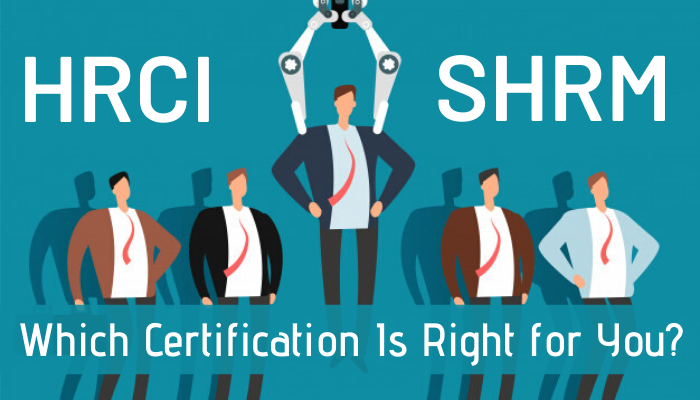SHRM and HRCI Certification Basics
If you are an HR professional in a small business or an office administrator, including HR duties, you might be asking yourself if you should apply for your HR certification. If you are an HR professional who is considering making a move to a new organization, odds are you see HR certification in either the desired or required categories for HR positions.
Despite your situation, you may still be wondering is an HR certification worth it? The fact is, only you can answer that question. But here are some additional questions to think that might aid you in making a decision.
What Is the Value of an HR Certification?
An HR certification is not needed to work in the field of human resources; however, for a change of reasons, today’s HR professionals are asking this formal recognition of their skills.
HR Certification is essential to me because it helps as a culmination of my experiences and knowledge that proves my peers and potential employers that I am a well-versed and dedicated HR professional, SHRM-CP told the Society for Human Resource Management.
It is not only a matter of showing that you have the skills and experiences needed, or making yourself more appealing to possible employers, according to data from Payscale, it appears that certifications better HR professionals across all levels earn a higher salary when they have a certification:
- With certification, median pay scale across all HR positions: $61,000/-
- Without accreditation, median pay scale across all HR positions: $45,600/-
The data also shows that with growing responsibility and scope, there is an increase in the percentage of HR professionals who hold some certification:
- 5% of HR assistants
- 11% of HR administrators
- 28% of HR generalists
- 30% of HR managers
- 39% of HR directors
- 42% of HR vice presidents
In addition to the personal and professional awards of earning an HR certification, these figures recommend that for career mobility and momentum, getting a certification can be a wise choice.
What Are HR Certifications Available? HRCI vs. SHRM
Currently, two providers conduct the HR certification process the HR Certification Institute (HRCI) and the Society for Human Resource Management (SHRM). Both HRCI and SHRM expect that applicants must meet the special education and work experience criteria at the time they submit their application.
HRCI Certification: aPHR, PHR, PHRca, SPHR, GPHR, PHRi
The first HRCI certification was awarded in 1973 through the American Society of Personnel Administration’s Accreditation Institute. During the past 40+ years, HRCI, an autonomous nonprofit organization, has been working to create HR worth.
They own accreditation from the National Commission for Certifying Agencies. HRCI currently offers a family of certifications, with levels of challenge primarily based on experience:
- Associate Professional in Human Resources (aPHR): Professionals who are new to the field of HR.
- Professional in Human Resources (PHR): Professionals with knowledge in technical and operational aspects of HR management.
- Professional in Human Resources California (PHRca): HR professionals with mastery of the laws, ordinances, and practices different from the state of California.
- Senior Professional in Human Resources (SPHR): HR leaders with a background and meaningful professional experience in the field of human resources.
- Global Professional in Human Resources (GPHR): HR practitioners focused on developing HR beyond national borders.
- Professional in Human Resources International (PHRi): For HR professionals working in a single international location.
There are eligibility terms for each HR certification based on education, minimum years of experience, and years of experience at specific levels.
While a PHR is not wanted before applying for the SPHR certification:
- You need to meet the eligibility conditions as stated on the HRCI minimum of 4 years of experience in a professional-level HR position with a Master’s degree or higher;
OR
- At least 5 years of experience in a professional-level HR position with a Bachelor’s degree; or, at least of 7 years of experience in a professional-level HR position with less than a Bachelor’s degree.
If you are wondering which HRCI certification is right for you, there is a convenient tool on their website which enables you to select your role, how many years you have worked in HR, and your areas of focus.
Based on the data you choose, you will be provided with a suggestion as to which certification is most appropriate for you.
SHRM Certification: SHRM-CP, SHRM-SCP
In 2015, SHRM began allowing a competency-based certification for human resource professionals. More than 30,000 HR professionals gave input about the HR competencies on which the SHRM tests are based.
SHRM currently allows two certifications, one for professionals with less experience and scope and certification focused on senior-level HR leaders:
- SHRM-Certified Professional (SHRM-CP): Professionals who perform HR policies, deliver HR services, support HR operations, and answer HR questions.
- SHRM-Senior Certified Professional (SHRM-SCP): HR professionals who manage HR functions, develop HR plans to align with organizational goals, impact results, and analyze performance metrics.
What Steps Should You Need to Get HR Certified?
Taking on this type of purpose can be overwhelming, but it does not have to break down the steps to make it appear.
Use this list as commencement and add any features of your own:
- Talk to HR professionals who are certified to get penetration into what worked for them in the certification process.
- Review the pros and cons of every HR certification program.
- Select a certification provider (HRCI or SHRM).
- Determine the relevant test level, based on your education and HR experience.
- Evaluate exam preparation and study options; pick one based on your knowledge style, schedule, and budget.
- Enroll in the test and any associated study programs.
- Study, study, and study some more.
- Take your certification test.
Re-take the test if needed many people do, so do not be hard on yourself Once you have considered the HR certification options and how they may or may not impact your career, you will know if now is the time to sign up to take the test and get certified.
Rest assured: test result information is familiar; the test providers do not publish who failed the exam or the number of times people have left the exam.
Only candidates can share their exam arrangements with third parties. If you do not feel compelled to begin the journey now, you should wait. Starting on the HR certification journey requires commitment.






